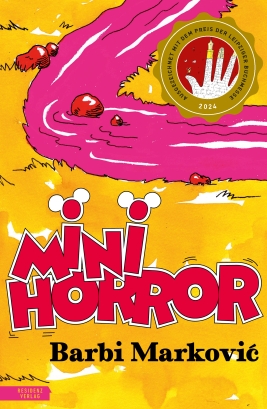Eine der Stärken von Bergers Erzählverfahren besteht darin,Widersprüche im Verhalten aller Figuren sichtbar zumachen. Individuelle Profitinteressen, soziale Fürsorge, feministische Argumente, aggressiver Moralismus und sozialer Geltungsdrang sind so miteinander verwoben, dass niemand eindeutig im Recht oder Unrecht ist.
[Quelle: Erika Thomalla, FAZ]
Clemens Bergers irrwitzige Romansatire rückt das Thema Mutterschaft und Care-Arbeit in ein Licht, in dem es Tim Felchlin bis jetzt noch nicht gesehen hat.
[Quelle: Tim Felchlin, SRF RADIO]
Die Welt ist käuflich, und damit jeder und jede: Das führt Clemens Berger gekonnt und unterhaltsam vor. (...) Er zeigt, wie volatil die Werte sind, auf denen die Gesellschaft unserer Tage ruht.
[Quelle: Peter Zimmermann, Ö1 EX LIBRIS]
Clemens Berger stellt in seinem rasanten und komischen Roman Fragen nach dem Wert von Care-Arbeit, Social-Media-Empörungen und Paradoxien der Warenwelt.
[Quelle: Florian Baranyi, ORF TOPOS]
Es ist interessant, dass ausgerechnet ein Mann sich dieser heiklen Materie literarisch angenommen hat. Kaum ein Thema hat ein derartiges Aufreger-Potenzial wie die Themen Muttermilch, Stillen und Geburt. Und Berger macht das sehr gut, nicht eine Minute kommt man auf die Idee, dass „Haus des flüssigen Goldes“ nicht von einer Frau geschrieben worden sein könnte. Das ist nicht überheblich-sexistisch gemeint, sondern als Kompliment.
[Quelle: Doris Kraus, DIE PRESSE]
Eigentlich ist dieser schlaue, unterhaltsam zu lesende Roman keine Satire, sondern eine Horrorgeschichte.
[Quelle: Barbara Beer, KURIER]
Eine spannend und flott erzählte Geschichte, die unseren aktuellen Lebensstil sehr anschaulich widerspiegelt, aber auch ein Plädoyer für Solidarität und Mutterliebe beinhaltet.
[Quelle: Hans Bogenreiter, AUGUSTIN]
Perfides vom Feinsten!
[Quelle: Astrid Kuffner, MADAME WIEN]
Eine gut erzählte, mit Freude an die Grenzen gehende Farce zwischen Empathie, Mutterliebe und Internet-Irrsinn.
[Quelle: BÜCHER magazin]
Der österreichische Autor hat eine Geschäftsidee rund um das Abpumpen und Verkaufen überschüssiger Muttermilch ins Zentrum seiner Satire gestellt, und stellt damit die Verrücktheiten unserer Gesellschaft gekonnt an den Pranger.
[Quelle: nau.ch]
Ein geniales, beschämendes, der Lust- und der Häme volles Buch, das uns staunend die Prozesse moderner Mythenbildung erkennen lässt.
[Quelle: Johannes Koessler – Buchhandlung Seeseiten]









